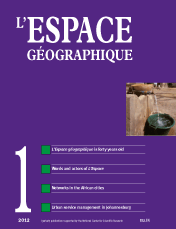

Editorial
Denise PUMAIN, Marie-Claire ROBIC. The Glorious Forties of L’Espace géographique
The words of L’Espace géographique
with contribution of The words of L’Espace géographique: A lexical analysis of the titles and keywords from 1972 to 2010 (2 fig., 5 tables.) (appendix)
This article studies the material produced by L’Espace géographique since the creation of the journal in 1972 on the basis of the titles and keywords of the 1090 articles published in this period. The statistical processing of this corpus enables the key-words specific to a given period to be pinpointed, and these provide good indications of the main stages in the history of the journal. In addition, lexical analysis of the titles of the articles evidences successive lexical fields. These approaches enable the scientific trajectory of the journal to be traced, and they reveal the journal’s spheres of reference. This provides a transect of the history of French geography over the last four decades, through the upheavals in the world to which the journal chose to devote page space.
keyword: L’ESPACE GÉOGRAPHIQUE, HISTORY OF GEOGRAPHY, LEXICAL ANALYSIS, TEXTUAL STATISTIC
Equipment and networks in African cities
David BLANCHON, Olivier GRAEFE. Networks in African cities: Theoretical frameworks and empirical research
Radical political ecology and water in Khartoum. A theoretical approach that goes beyond the case study (1 box, 2 fig., 1 table)
Radical political ecology, a new branch of political ecology focusing on the issue of water in cities, has gained momentum over the last 15 years in Englishlanguage academia; created by Erik Swyngedouw, it has spread through the work of his students. This article begins by laying out this school’s concepts, before demonstrating the approach’s usefulness in the case study of Khartoum’s water supply system. More specifically, we will examine how this approach differs from those with whom the French readership is more familiar.
keyword: MANAGEMENT, POLITICAL ECOLOGY, SUDAN, WATER
Networked services and features of African urbanization: Other path toward globalization (3 fig., 2 tables)
The provision of basic services in African cities does not rely solely on centralized, integrated, networked infrastructures, it can also involve “alternative” socio-technical systems. Examining the conditions of urbanization in Africa, this article proposes an analytical framework for understanding the spread of delivery configurations consisting of heterogeneous socio-technical subsystems, and suggests that these patterns could better inform new policies.
keyword: AFRICAN URBANIZATION, MODEL, NETWORK, SERVICE
The international circulation and social contructions of a policy model: City Improvement Districts and urban service management in Johannesburg
The international circulation of policy models and their transfer from one geographical context to another constitute the core of many theoretical and methodological debates. By examining Johannesburg’s adoption of the North American model of Business Improvement Districts, this article mobilizes both French and English language scholarship to analyze the social construction of this model. Attention is paid to the ways in which knowledge is constituted and circulates. The discursive approach throws light on the ways in which this model is re-interpreted locally, in particular through decontextualization and recontextualization processes that operate within entrepreneurial strategies at the micro-local scale.
keyword: BUSINESS IMPROVEMENT DISTRICT, CIRCULATION, JOHANNESBURG, MOBILITY, POLICY TRANSFER
Mobile telephony in African cities. A succesful adaptation to local context
The exponential development of mobile telephony in Africa is essentially an urban phenomena whose materiality is so pervasive that it has become one of the principal markers of landscape, both in public space and via the creation of specialized markets. This success can be explained by the capacity of international service providers to adapt both to the demands of a poor population and to the response of small private service providers. “Innovations through use” in urban, working-class economies have generated a new, informal communication economy, with the proliferation of subcontracting, repair, and reprogramming activities that pervade public space and add to the omnipresent advertising.
keyword: CITY, INFORMAL ECONOMY, MOBILE TELEPHONY, PRIVATE OPERATOR
L’espace géographique 4/11![]()
![]() L’espace géographique 2/12
L’espace géographique 2/12
For subscribe or buy this issue: BELIN
![]() L’Espace géographique: contents
L’Espace géographique: contents
Last modified: April 2, 2013